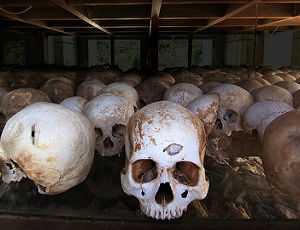Cambodia may not be in the news much anymore, but the scars from its past are everywhere. The trials of the Khmer Rouge seem to have ground to a halt, and Pol Pot died of old age in the jungle, surrounded by loyal cadres. Land mines and unexploded ordnance are still buried around the country and still kill and maim. But it's beautiful nonetheless, especially to those who left.
Vaddey Ratner, author of the fictionalized biography In the Shadow of the Banyan, has a new novel out: Music of the Ghosts. Teera and her young aunt flee Pol Pot's Cambodia and settle in Minneapolis. 25 years after immigrating to the United States, Teera's aunt has died and Teera receives a letter from a mysterious old man who claims to have known her father in prison and his exact fate. Traveling to Cambodia, Teera is faced with the contradictions of a country where the guilty live alongside their victims and even the line between the two is blurred. Moving between past and present, great beauty and utter barbarism, this is a haunting novel of those who try to do the right thing, sometimes failing, but always looking for redemption.
Serey and Anne are young lovers in Montreal in Kim Echlin's The Disappeared. Anne's father does not approve, and predicts that Serey will leave as soon as the borders of Cambodia open and he can search for his family. Not only does Serey do just that, he never answers the letters Anne writes him. Why not? Apparently, he never received them. Perhaps Anne's father never sent them, or it may be the restrictive regime that arose from the ashes of the Khmer Rouge. Anne goes in search of Serey in Phnom Penh eleven years after they part. This is the frame for a rumination on loss, justice, accountability, and love.
If you're interested in nonfiction about Cambodia and its expatriates, there's Lucky Child by Loung Ung. Ung was able to escape the Khmer Rouge (her experiences under them are recounted in First They Killed My Father), but her sister Chou remained behind. Ung's book alternates between the immigrant experience in 1980s Vermont with Chou's struggle for survival. When the sisters are reunited after 15 years, what happens will leave you teary and relieved.
Sichan Siv may not be a household name, but he served well in both Bush administrations. In Golden Bones, he tells us how he got there. When the Khmer Rouge came to power, Siv was a teacher. He was soon relegated to slave labor until he made a daring escape from the camp and Cambodia on foot. After working menial jobs in New York, Siv managed to enter Columbia University and work his way back into the middle class and into political life. Siv's love for his adopted country is obvious on every page, and this is a book that will make you glad to be American.
Do you have tales about the long journey home? Please share them in the comments.




Add a comment to: Back to the Killing Fields